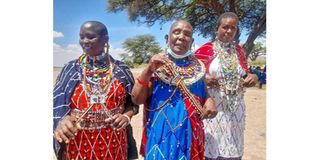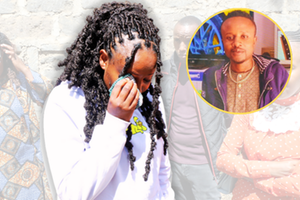How Amboseli women are beading their way into financial freedom

What you need to know:
- They have also been contracted to supply rangers in conservancies with food, thus earning extra cash.
- They have broken from tradition that diminishes the place of Maasai women at the family and community levels.
Among the Maasai, a largely patriarchal community, the place of women is greatly diminished as culturally instilled values make them inferior to men.
Men are the sole providers of their families as women are expected to do cleaning, cook and take care of children.
This is, however, not the case for Esther Katamboi, who has found her way into financial freedom, not only owning cattle and buying household items but also being able to pay for her children’s education.
“Previously, I would stay in the house and depend on my husband and could not even afford money to buy utensils. When I asked for money from him, he would brush it off,” says the 70-year-old.
She and 178 other women from Esisteti village, adjacent to Amboseli National Park and Mt Kilimanjaro in neighbouring Tanzania, are part of Osiotua Esiteti, a community-based organisation that beads different ornaments for export under the Inua Kijiji initiative, earning good money.
Break from tradition
Ms Katamboi is the chairperson of Osiotua Esiteti, which was founded in 2018. She takes pride in jointly owning a herd of cattle with other members.
In her house, she now has a solar lamp and a wooden bed, something that is rare in the community, which still relies on animal skin or woven traditional beds.
Ms Katamboi learnt about the business when she and other women were taken by the International Fund for Animal Welfare (IFAW), a global conservation organisation supporting indigenous communities, to benchmark with women from the Maasai community based in the Mara.
“We were not aware that this was possible. From them, we learnt that this beading could earn us a lot of money. I was trained in how to do it and came back to teach the other women in the group.
“I saw that many women had been empowered in Masai Mara and knew that this would change our lives in Amboseli too,” she says.
Unique designs
Immediately after the training, IFAW bought them beads and strings. Instead of staying at home, they would from then gather under a tree to bead, coming up with unique designs.
They would also make beaded clothing, like the one Ms Katambua dons during her interview with the Nation.Africa.
Table banking
Other than saving some of their profits through table banking, the women have bought 13 bulls, something they could not do earlier.
Lilian Kilelo, their secretary, now pays school fees for her children from the proceeds of the export business.
“I can also afford to buy myself the best expensive clothes that I need without necessarily asking for the money from my husband,” she says, adding that their men have been supportive.
“Our husbands have seen its benefits since we can step in when they are low on money. We, as women, also no longer demand money from them, and our children cannot go to bed without food.”
So far, the women have exported their products four times. The highest amount they have earned is Sh1.3 million, while the least is Sh300,000.
Ms Kilelo said the money is deposited directly into their bank account, from where they share it out.
Some money is contributed as savings through table-banking.
“With table-banking, we contribute at least Sh100 monthly and it helps us purchase household items such as utensils,” she says.
Conservation
According to IFAW’S female empowerment assistant Daisy Ochiel, who stays with the women in the Amboseli ecosystem, the project, Inua Kijiji started three years ago, with 73 women enrolled. More women are set be trained.
“As the community helps with the conservation of wild animals in their area, it was important for the women to have an income-generating activity, hence the idea,” she says.
IFAW helps the women to find market for their products, most of which are sold to its donors in the UK. The women have also been contracted to supply rangers in conservancies with food, earning extra cash.
During an interview with Nation.Africa, IFAW president Azzedine Downes said involving women in conservation was important.
“Within such communities, the men are the ones involved in key talks, but we saw the need to include the women, even though not directly, to ensure the whole community is playing a significant role in conserving the ecosystem and benefitting from it at the same time,” he said.
For Ms Katamboi, the benefits of Inua Kijiji and the beading business have not only helped her financially but also promoted wildlife conservation.
“My life has changed just because of protecting wild animals, so if I saw one now, I would not rush to kill it as it was before, I would do all I can to chase it back into the wild. I now know their value; without them, there will be no tourists or any other benefits that we get staying near the national park,” she said.





